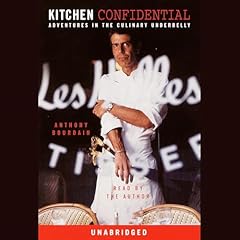
The Story of Sushi
An Unlikely Saga of Raw Fish and Rice
No se pudo agregar al carrito
Add to Cart failed.
Error al Agregar a Lista de Deseos.
Error al eliminar de la lista de deseos.
Error al añadir a tu biblioteca
Error al seguir el podcast
Error al dejar de seguir el podcast
 Exclusivo para miembros Prime: ¿Nuevo en Audible? Obtén 2 audiolibros gratis con tu prueba.
Exclusivo para miembros Prime: ¿Nuevo en Audible? Obtén 2 audiolibros gratis con tu prueba.Compra ahora por $20.78
-
Narrado por:
-
Brian Nishii
-
De:
-
Trevor Corson
Everything you never knew about sushi: its surprising origins, the colorful lives of its chefs, and the bizarre behavior of the creatures that compose it. Trevor Corson takes us behind the scenes at America's first sushi-chef training academy, as eager novices strive to master the elusive art of cooking without cooking. He delves into the biology and natural history of the edible creatures of the sea, and tells the fascinating story of an Indo-Chinese meal reinvented in 19th-century Tokyo as a cheap fast food. He reveals the pioneers who brought sushi to the United States and explores how this unlikely meal is exploding into the American heartland just as the long-term future of sushi may be unraveling.
The Story of Sushi is at once a compelling tale of human determination and a delectable smorgasbord of surprising food science, intrepid reporting, and provocative cultural history.
©2007 Trevor Corson (P)2010 Audible, Inc.Los oyentes también disfrutaron:




















Reseñas editoriales
Trevor Corson is not a writer as much as he is a seafood expert, and both The Secret Life of Lobsters and The Story of Sushi have quickly achieved best seller status on the strength of the interesting information they carry. Sushi has only been a part of American cuisine for a few decades, and there are surprisingly few comprehensive perspectives that treat the history, the cooking, and the art. Corson's book amply fills this void, as long as you are listening to it as a piece of reportage more than a novel with a plot.
Whatever faults there are in the writing, the telling does not compound them. Brian Nishii has as few narration credits as Corson has author credits, but you'd never know it. He handles the many facets of this book with energy and agility. One strand running through the book is a straightforward factual account of the history of sushi, both as traditional Japanese cuisine and as modern American trend. A second strand is the more scientific description of the different varieties of seafood and their assorted properties. The third strand attempts to humanize the difficulty of the art of making sushi by following a class of beginners through sushi school.
Tokyo-born Nishii nails all the pronunciation with ease and fluidity. Fans of sushi will be relieved and possibly embarrassed to learn the proper way to order and eat their food. The helpful tips abound, from the fat content of each fish to what you are really eating when you eat wasabi to the importance of the radish garnishing your plate. There is also a heaping dose of amusing facts. For example, the phrase "mac daddy" actually comes from the idea that the skin of the mackerel is very shiny, and salmon is actually a white fish that turns pink for the same reason flamingos do.
Nishii also deftly handles the Japanese-Australian accent of a pop star turned sushi school chef, a strange and delightful sound to the American ear, delivering a relatively satisfying gem of a portrait amidst Corson's cast of flat characters — the timid depressive who can't do anything right, the 17-year-old kid taking this class to impress girls, the beautiful stoic from Finland who executes each roll to perfection, the hard-working sous chef destined to find a job right after graduation, et cetera. The more informative two-thirds of the book certainly make up for Corson's missteps in the sushi school thread, and Nishii's voice work will reassure you that next time you sit down at the sushi bar, you'll be at the head of the class. —Megan Volpert
Reseñas de la Crítica
What made the experience of listening to The Story of Sushi the most enjoyable?
How Sushi started, how difficult it is to do it right and how Americans changed Sushi,Who was your favorite character and why?
The young traineeWhich character – as performed by Brian Nishii – was your favorite?
The teacherIf you were to make a film of this book, what would the tag line be?
It's not as easy as it looksHow Americans changed Sushi
Se ha producido un error. Vuelve a intentarlo dentro de unos minutos.
Fascinating
Se ha producido un error. Vuelve a intentarlo dentro de unos minutos.
More like the Story of Sushi in America
Se ha producido un error. Vuelve a intentarlo dentro de unos minutos.
What did you love best about The Story of Sushi?
the understanding and level of detail the Japanese have put into the understanding of taste and health.Who was your favorite character and why?
The New Zealander. I like his driving ways.Have you listened to any of Brian Nishii’s other performances before? How does this one compare?
NoWas there a moment in the book that particularly moved you?
the intricate taste of sushiAny additional comments?
You will enjoy the book. you learn about sushi and that what we generally have in america is not traditional Japanese sushiI never thought a sushi book would be interesting!
Se ha producido un error. Vuelve a intentarlo dentro de unos minutos.
Sushi is Interesting
Se ha producido un error. Vuelve a intentarlo dentro de unos minutos.


